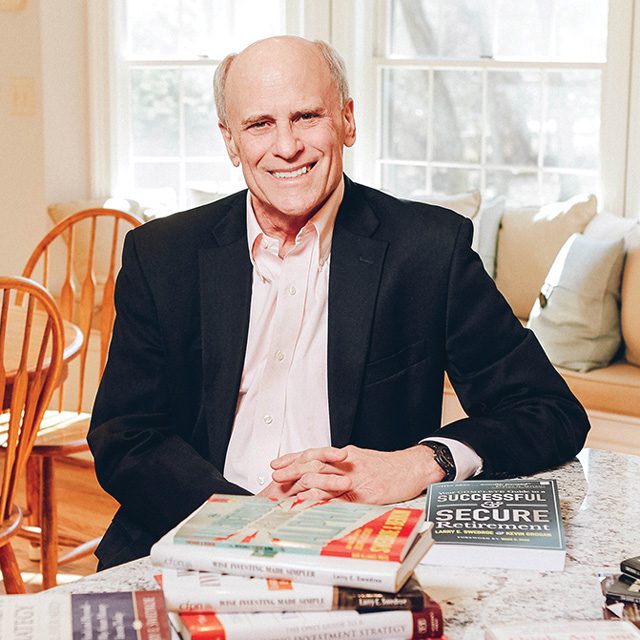Larry Swedroe: This Big Investing Mistake Could Tank Your Clients' Retirement

What’s the worst error made in retirement planning today?
“The biggest mistake is estimating U.S. stock returns for the total market: The odds of getting 10% over the next 30 years are extremely low,” argues Larry Swedroe, head of financial and economic research at Buckingham Strategic Wealth, in an interview with ThinkAdvisor. “People should be planning on more like 5% or 6% … if we’re lucky.”
He identifies “significant downside risk” in the stock market with persistent inflation as the biggest risk.
In the interview, Swedroe, a member of Buckingham’s investment policy committee, discusses the possibility of the Federal Reserve’s raising interest rates not only this month but in September and possibly November.
“You have to have higher and higher interest rates to get the same impact on the overall economy [as did raising rates formerly],” he says. Years ago, the interest-rate-sensitive sectors comprised as much as a third of GDP. Now they’re “a much smaller percentage, and the [strong] service sector is 70% to 80% — which isn’t interest-rate sensitive.”
Longer-term, he sees left-tail risk, indicating the likelihood of a sharp market crash, especially in high-tech growth stocks. (“To me,” he says, “this is starting to smell like bubbles.”)
Prior to joining Buckingham in 1996, Swedroe was vice chairman of Prudential Home Mortgage and a senior vice president at Citicorp.
He authored “The Only Guide to a Winning Investment Strategy You’ll Ever Need” (2005) and subsequently published several more books, including “Your Complete Guide to a Successful & Secure Retirement” (2019), co-written with Kevin Grogan, and “Your Essential Guide to Sustainable Investing” (2022), co-authored with Samuel C. Adams.
In the interview, citing the strategy of alternative investing, Swedroe reveals that “well over 40%” of his own portfolio is in alternatives, and he names the fund he owns that pays him an 11% yield.
ThinkAdvisor recently interviewed Swedroe, who was speaking by phone from his home office in the St. Louis, Missouri, area. Here are the highlights of our interview:
THINKADVISOR: What’s the worst error being made with retirement planning?
LARRY SWEDROE: The biggest mistake is estimating U.S. stock returns for the total market. The odds of getting 10% over the next 30 years are extremely low. People should be planning on more like 5% or 6%. That is, if we’re lucky.
Bond yields today are at about 3.5%.
If you’re talking about a 60/40 [retirement] portfolio, you can expect a return of 4.5%. Can you live on that?
You have to make sure your plan includes a good estimate of expected returns.
Do you foresee a recession occurring in the U.S. this year?
The economic outlook is a bit weaker, but I think the odds are about 50/50 that we can avoid a recession. There’s still too much good news. You’re still seeing reasonably good growth in the economy.
Why aren’t the interest rate increases hurting the economy more?
Monetary policy that used to work 40 or 50 years ago doesn’t work as effectively today because the interest-sensitive sectors of the economy — like manufacturing and housing — are a much smaller percentage of the GDP. They’ve gone from a third to roughly 10%.
So the percentage of the economy that’s reliant on interest rates is much smaller.
The service sector is still very strong; you see that in the employment numbers.
So when you raise interest rates, it doesn’t have the same impact on the economy because the service sector — about 70%-80% of the economy and including health care and restaurants — isn’t interest-rate sensitive. Therefore, if they’re not hurt, you have to have higher and higher interest rates to get the same impact on the overall economy [as you did in former years].
What’s the biggest risk to the stock market over the next 12 months?
Inflation. It’s more persistent than people think. So the Fed has to stay tighter for longer. They may have to raise rates not only this month but again in September and maybe in November, to 6%.
What other risks do you perceive?
The left-tail risk [of a sharp stock market crash based on a period of underperformance] has increased, at least in the U.S. market, specifically for stocks that have driven this big rally. [That is] the high-tech growth stocks.
To me, this is starting to smell like bubbles.
What’s your outlook for the stock market longer-term?
The odds favor lower returns. The valuations on the large-cap growth stocks that dominate the S&P 500 have been very high historically, and that predicts lower future returns.
Crashes tend to happen when you have very high valuations.
The Federal Reserve published a white paper this past May called “End of an Era: The Coming Long-Run Slowdown in Corporate Profit Growth and Stock Returns.”
It says, “The boost to profits and valuations from ever-declining interest and corporate tax rates is unlikely to continue, indicating significantly lower profit growth and stock returns in the future.” Your thoughts?
The collapse in interest rates over the past 40 years has been a big tailwind for corporate profits: Interest expense has come way down. And corporations have taken advantage of the much lower rates to extend maturities.
But rates are likely to be higher than they are now; so the interest exposure will be higher. That will act as a headwind relative to the past, in which we had a tailwind.
What else is affecting corporate earnings in a big way?
The corporate tax rate has come way down in the last 40 or 50 years, from about 25% to, effectively, about 10%.




